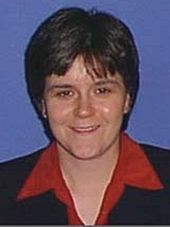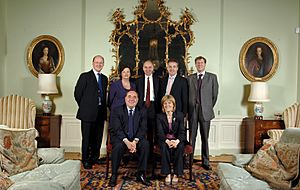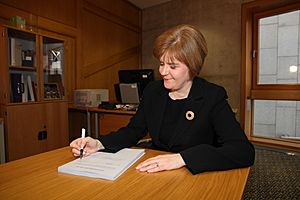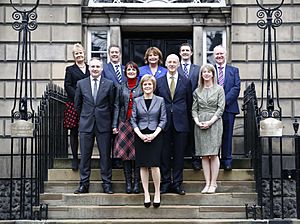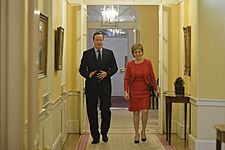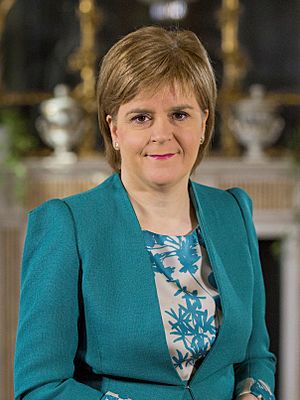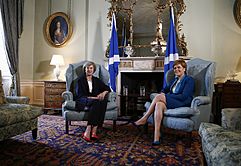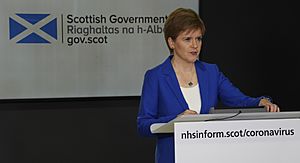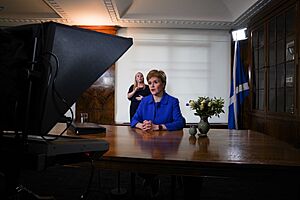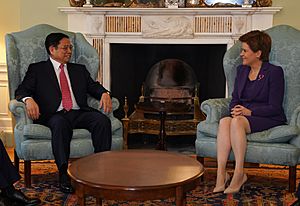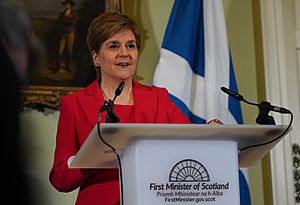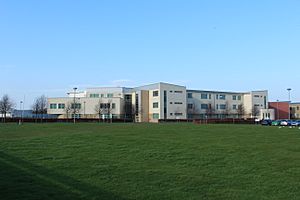Nicola Sturgeon facts for kids
Quick facts for kids
Nicola Sturgeon
|
|||||||||||||||||||||||||
|---|---|---|---|---|---|---|---|---|---|---|---|---|---|---|---|---|---|---|---|---|---|---|---|---|---|
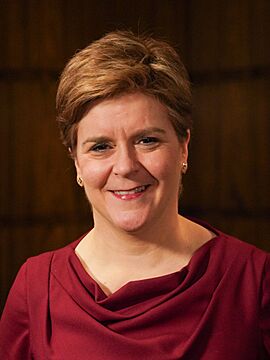
Official portrait, 2021
|
|||||||||||||||||||||||||
| First Minister of Scotland | |||||||||||||||||||||||||
| In office 20 November 2014 – 28 March 2023 |
|||||||||||||||||||||||||
| Monarch | Elizabeth II Charles III |
||||||||||||||||||||||||
| Deputy | John Swinney | ||||||||||||||||||||||||
| Preceded by | Alex Salmond | ||||||||||||||||||||||||
| Succeeded by | Humza Yousaf | ||||||||||||||||||||||||
| Leader of the Scottish National Party | |||||||||||||||||||||||||
| In office 14 November 2014 – 27 March 2023 |
|||||||||||||||||||||||||
| Depute |
|
||||||||||||||||||||||||
| Preceded by | Alex Salmond | ||||||||||||||||||||||||
| Succeeded by | Humza Yousaf | ||||||||||||||||||||||||
| Deputy First Minister of Scotland | |||||||||||||||||||||||||
| In office 17 May 2007 – 20 November 2014 |
|||||||||||||||||||||||||
| First Minister | Alex Salmond | ||||||||||||||||||||||||
| Preceded by | Nicol Stephen | ||||||||||||||||||||||||
| Succeeded by | John Swinney | ||||||||||||||||||||||||
| Depute Leader of the Scottish National Party | |||||||||||||||||||||||||
| In office 3 September 2004 – 14 November 2014 |
|||||||||||||||||||||||||
| Leader | Alex Salmond | ||||||||||||||||||||||||
| Preceded by | Roseanna Cunningham | ||||||||||||||||||||||||
| Succeeded by | Stewart Hosie | ||||||||||||||||||||||||
|
|||||||||||||||||||||||||
|
|||||||||||||||||||||||||
| Personal details | |||||||||||||||||||||||||
| Born |
Nicola Ferguson Sturgeon
19 July 1970 Irvine, Ayrshire, Scotland |
||||||||||||||||||||||||
| Political party | Scottish National Party | ||||||||||||||||||||||||
| Spouse |
Peter Murrell
(m. 2010; sep. 2025) |
||||||||||||||||||||||||
| Parents |
|
||||||||||||||||||||||||
| Alma mater | University of Glasgow | ||||||||||||||||||||||||
| Cabinet |
|
||||||||||||||||||||||||
| Signature | |||||||||||||||||||||||||
| Website | Parliament website | ||||||||||||||||||||||||
Nicola Ferguson Sturgeon (born 19 July 1970) is a Scottish politician. She was the First Minister of Scotland and Leader of the Scottish National Party (SNP) from 2014 to 2023. She has been a member of the Scottish Parliament (MSP) since 1999. She first represented the Glasgow electoral region. Later, she became the MSP for Glasgow Southside (formerly Glasgow Govan) from 2007.
Born in Ayrshire, Sturgeon studied law at the University of Glasgow. She worked as a solicitor in Glasgow before being elected to the Scottish Parliament in 1999. She served as the SNP's spokesperson for education, health, and justice. In 2004, she joined Alex Salmond as his deputy leader. Since Salmond was still a Member of Parliament, Sturgeon led the SNP in the Scottish Parliament as Leader of the Opposition from 2004 to 2007.
After the SNP became the largest party in the 2007 Scottish Parliament election, Salmond formed a government. Sturgeon became his deputy. From 2007 to 2012, she was the health secretary. She oversaw the removal of prescription charges. After the SNP won a large majority in 2011, she became Cabinet Secretary for Infrastructure, Capital Investment and Cities. In this role, she helped prepare for the 2014 Scottish independence referendum. After the "No" vote in the referendum, Salmond resigned.
Sturgeon was elected SNP leader without opposition in November 2014. She then became the First Minister, the first woman to hold either role. The SNP gained many new members, which helped them win 56 out of 59 Scottish seats in the 2015 United Kingdom general election. This made them the third-largest party in the House of Commons. The SNP continued to do well in elections during Sturgeon's nine years in office.
Sturgeon led the Scottish Government's response to the COVID-19 pandemic. This included putting in place restrictions and rolling out the vaccine programme. In 2021, she became the only First Minister to serve a third term. She then made a power-sharing agreement with the Scottish Greens. Her government's calls for a second independence referendum were not successful. On 15 February 2023, Sturgeon resigned as SNP leader. She said the job was very demanding. Humza Yousaf became her successor the following month.
Contents
- Early Life and Education
- Legal Career
- Early Political Career
- Deputy First Minister of Scotland (2007–2014)
- Leadership of the Scottish National Party
- First Minister of Scotland (2014–2023)
- Post-Premiership (2023–present)
- Awards and Acknowledgements
- Personal Life
- See also
Early Life and Education
Nicola Ferguson Sturgeon was born in Irvine on 19 July 1970. She is the older of two daughters. Her mother, Joan Kerr Sturgeon, was a dental nurse. Her father, Robin Sturgeon, was an electrician. Her younger sister, Gillian Sturgeon, works for the NHS.
Sturgeon grew up in Prestwick and the village of Dreghorn. She was a quiet child who loved reading. She described herself as a "goth" teenager. She enjoyed music groups like Wham! and Duran Duran.
She went to Dreghorn Primary School from 1975 to 1982. Then she attended Greenwood Academy from 1982 to 1988. She later studied law at the University of Glasgow School of Law. She earned her law degree in 1992. While at university, she was active in the Glasgow University Scottish Nationalist Association.
Legal Career
After graduating, Sturgeon completed her legal training at McClure Naismith in Glasgow. She became a solicitor in 1995. She then worked for law firms in Stirling and Glasgow. She also worked at the Drumchapel Law Centre until her election to the Scottish Parliament in 1999.
Early Political Career
Joining Politics
Sturgeon joined the Campaign for Nuclear Disarmament (CND) in her early teens. In 1986, at age 16, she became a member of the Scottish National Party (SNP). She quickly became involved in the party's youth section. She campaigned door-to-door in the 1987 United Kingdom general election.
Sturgeon said that Margaret Thatcher inspired her to enter politics. She felt it was wrong for Scotland to be governed by a party it had not elected.
In the 1992 United Kingdom general election, Sturgeon became Scotland's youngest parliamentary candidate at 21. She ran in Glasgow Shettleston but did not win. She also ran unsuccessfully in local council elections.
In the 1997 United Kingdom general election, Sturgeon ran for the Glasgow Govan seat. She did not win, but her campaign saw a notable shift in votes. After this, she became the SNP's spokesperson for energy and education.
In Opposition at Holyrood
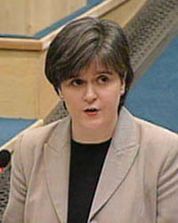
Sturgeon was elected as a Member of the Scottish Parliament in the 1999 Scottish Parliament election. She was elected through the regional list for Glasgow. The SNP became the second-largest party.
She served as Shadow Minister for Children and Education from 1999 to 2000. She also supported efforts to remove a law that banned promoting homosexuality in schools. From 2000 to 2003, she was Shadow Minister for Health. From 2003 to 2004, she was Shadow Minister for Justice.
Becoming Deputy Leader
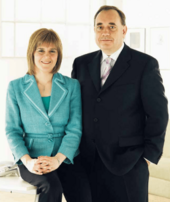
In 2004, John Swinney resigned as SNP Leader. Sturgeon entered the leadership contest. However, she later withdrew and supported Alex Salmond. She ran as his running mate for deputy leader.
On 3 September 2004, Salmond and Sturgeon were elected Leader and Depute Leader. Since Salmond was still a UK Member of Parliament, Sturgeon led the SNP in the Scottish Parliament. She served as Leader of the Opposition until the 2007 Scottish Parliament election. She became known for her strong debating style.
Deputy First Minister of Scotland (2007–2014)
In the 2007 Scottish Parliament election, Sturgeon won the Glasgow Govan constituency. The SNP became the largest party. Alex Salmond formed a minority government. He appointed Sturgeon as Deputy First Minister. She was also given the role of Cabinet Secretary for Health and Wellbeing.
Health Secretary (2007–2012)
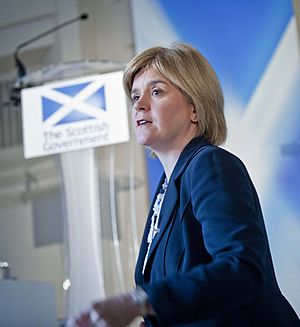
As Health Secretary, Sturgeon launched a plan for NHS Scotland. She reversed decisions to close some hospital units. She also oversaw the removal of prescription charges in Scotland.
She aimed for a maximum 18-week wait for patients after seeing their GP. She also ordered a review of hospital car parking charges.
Public Health Measures
Sturgeon became known for her handling of the 2009 flu pandemic. She confirmed the first cases in Scotland in April 2009. When the World Health Organization declared a pandemic, she told the Scottish Parliament that containment had failed. She then focused on slowing the virus's spread.
To address alcohol issues in Scotland, Sturgeon supported a law to increase the minimum price of alcohol. The Alcohol (Minimum Pricing) (Scotland) Act 2012 was passed in June 2012.
Infrastructure Secretary (2012–2014)
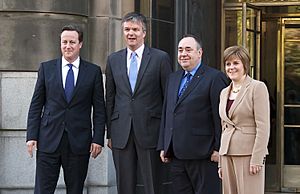
After the SNP won a large majority in the 2011 Scottish Parliament election, Sturgeon remained Deputy First Minister. A year later, she became Cabinet Secretary for Infrastructure, Capital Investment and Cities. She also took on a key role in overseeing the 2014 Scottish independence referendum.
In 2012, she proposed building a high-speed railway line between Glasgow and Edinburgh. This plan was later abandoned in 2016.
2014 Scottish Independence Referendum
Sturgeon was in charge of the Scottish Government's plans for the 2014 Scottish independence referendum. She was a leading voice in the "Yes" campaign. She argued that independence would help Scotland build a stronger economy.
She also debated the idea of Scotland using the pound sterling after independence. The UK Government said this would not be clear. Sturgeon accused Westminster of trying to "bully Scotland".
The referendum took place on 19 September 2014. Independence was rejected, with 55.3% voting "No" and 44.7% voting "Yes". After the defeat, Alex Salmond resigned. Sturgeon quickly announced her intention to run for leader. She said it would be "no greater privilege" than to lead the SNP.
Leadership of the Scottish National Party
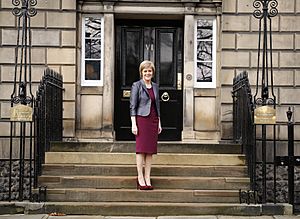
On 24 September 2014, Sturgeon officially launched her campaign to become SNP Leader. It soon became clear she would be the only candidate. She was confirmed as the first female Leader of the SNP on 14 November 2014. This also made her the First Minister-Designate.
In her first speech as leader, Sturgeon said it was "the privilege of her life" to lead the party. She promised to be "the most accessible First Minister ever". She also pledged to hold monthly online Q&A sessions and regular town hall meetings.
Although Salmond resigned on 18 November 2014, Sturgeon was sworn in two days later. From 18 to 20 November, she served as acting First Minister.
First Minister of Scotland (2014–2023)
First Term (2014–2016)
On 20 November 2014, Sturgeon was sworn into office at the Court of Session. She became the first woman to hold the position of First Minister. In her first First Minister's Questions, she aimed for a cooperative approach.
First Cabinet
Sturgeon began appointing her first cabinet on 21 November 2014. John Swinney became her Deputy First Minister. Shona Robison became the health secretary. Her cabinet had an equal number of men and women.
2015 UK General Election
Sturgeon led the Scottish National Party to a huge victory in the 2015 UK general election. The SNP won 56 out of 59 Scottish seats in Westminster. This was the party's best performance ever. They received 50% of the vote in Scotland. Sturgeon said this success was not a mandate for another independence referendum. Instead, it was for a stronger Scottish voice in London.
2016 Scottish Parliament Election
Sturgeon launched what she called the SNP's most "bold, ambitious and reforming" manifesto for the 2016 Scottish Parliament election. The party planned to increase income tax. The manifesto also included more NHS funding and "baby boxes" for new parents.
Despite losing her majority, Sturgeon called it a "historic victory". The SNP won a third term in government. She formed a minority government.
Second Term (2016–2021)
2016 EU Membership Referendum
In 2016, the UK held a referendum on its European Union membership. The UK voted to leave, but Scotland voted to remain. Across Scotland, 62% voted to stay in the EU.
Sturgeon responded on 24 June 2016. She said Scottish Government officials would start planning for a second independence referendum. She argued that Scotland's future was with the European Union. She felt it was "democratically unacceptable" for Scotland to leave the EU against its will.
Future Independence Referendum
Sturgeon confirmed in June 2016 that the Scottish government would draft laws for a second independence referendum. For this to be legal under UK law, it needed approval from the British Parliament.
In March 2017, the Scottish Parliament voted for another independence referendum. Sturgeon then formally asked the Prime Minister for permission. However, the Prime Minister said it was not the right time. All plans for a referendum were put on hold after the COVID-19 pandemic began.
2017 UK General Election
Sturgeon campaigned for a strong SNP result to support a second independence referendum. However, the SNP lost 21 seats in the 2017 United Kingdom general election in Scotland. Their vote share dropped by 13%. Sturgeon admitted these results were "bitterly disappointing". She acknowledged that her party's referendum plans were a factor.
Several weeks later, Sturgeon told the Scottish Parliament she would "reset" her plans. She would delay a second independence referendum.
COVID-19 Pandemic Response
The worldwide pandemic began during Sturgeon's second term. The first case in Scotland was confirmed on 1 March 2020. On 20 March, Sturgeon's government closed all schools and nurseries. On 23 March, Scotland went into "lockdown". This limited reasons for people to leave their homes.
In July 2020, Sturgeon suggested the UK nations adopt a coordinated strategy. In February 2021, Audit Scotland reported that the Scottish government had not prepared enough for a pandemic. Sturgeon said there were "lots of lessons to learn".
In March 2021, a court ruled that the Scottish government's ban on communal worship during the pandemic was unlawful. In April 2021, Scotland's COVID-19 death toll passed 10,000. In June 2021, Sturgeon said she would have imposed lockdown earlier if she could turn back time.
Third Term (2021–23)
Sturgeon led the SNP into the 2021 Scottish Parliament election. Her manifesto promised a second independence referendum after the pandemic. The SNP won 64 out of 129 seats. This was their fourth election win in a row.
Sturgeon was nominated as First Minister on 18 May. She became the first First Minister to form a third government. She appointed John Swinney to a new role for COVID Recovery.
Power-Sharing Agreement
In August 2021, Sturgeon and Scottish Green Party co-leaders reached a power-sharing agreement. This agreement strengthened the case for an independence referendum. The Green Party co-leaders were nominated to serve as ministers.
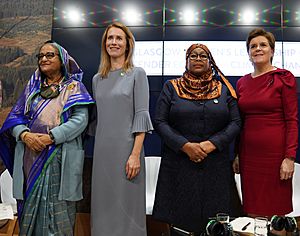
Climate Change Focus
In August 2021, Sturgeon was asked about the Cambo oil field. She later wrote to Prime Minister Boris Johnson. She asked for the development of Cambo to be "reassessed". This was a big change for the SNP, which had supported the oil and gas industry. In November 2021, Sturgeon said she believed the oilfield "should not get the green light".
Ferry Delays
In the late 2010s, Scottish islanders complained about unreliable ferries. The Scottish Government had ordered two new ferries in 2015. However, their construction faced many delays and cost increases. In 2022, Audit Scotland found that the government had awarded contracts without proper financial checks.
Sturgeon expressed "deep regret" for the chaos. She said the government was "learning lessons".
Second Independence Referendum Proposals
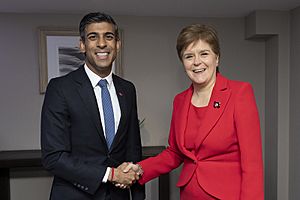
In June 2022, Sturgeon unveiled new plans for Scottish independence. She argued her government had a clear mandate for a second referendum. She believed independence would offer "a different and better vision". She also claimed there was a legal way to hold a referendum without UK Government permission. The Prime Minister rejected her plan.
Sturgeon scheduled the referendum for 19 October 2023. She asked the Prime Minister to agree to the vote. She also asked Scotland's Lord Advocate to refer the matter to the Supreme Court of the United Kingdom. This was to determine if the Scottish Government could hold a referendum without UK Government approval. The Supreme Court later ruled that the Scottish Parliament did not have this power.
In October 2022, Sturgeon launched her government's third independence paper. It outlined plans for currency in an independent Scotland and joining the EU. She proposed using the pound sterling briefly before a new 'Scottish Pound'.
Gender Recognition Reforms
As part of the SNP's 2016 manifesto, Sturgeon pledged to reform how trans people change their legal gender. This policy caused debate within the party. The bill was delayed during her second term. In the 2021 SNP manifesto, Sturgeon again committed to reforming the Gender Recognition Act 2004.
On 22 December 2022, the Scottish Parliament passed the Gender Recognition Reform (Scotland) Bill. On 17 January 2023, the UK Government used a special power to block the bill. Sturgeon opposed this decision. She called it an attack on the Scottish Parliament.
Resignation
On 15 February 2023, Sturgeon resigned as first minister of Scotland and leader of the Scottish National Party. This was pending a leadership election. At a press conference, Sturgeon said her resignation was not due to "short term pressures". She stated that the job "takes its toll on you".
Post-Premiership (2023–present)
After resigning as First Minister, Sturgeon returned to being an MSP for Glasgow Southside. She made her first speech in parliament since her resignation on 7 September 2023.
SNP Finance Inquiry
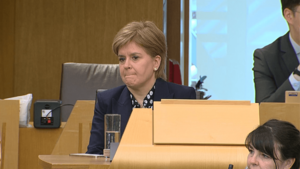
An inquiry was launched into the spending of money raised for independence campaigning. On 5 April 2023, Sturgeon's husband, Peter Murrell, was arrested. Their home was searched. Murrell was later released without charge.
On 11 June 2023, Sturgeon was arrested by Police Scotland as part of the investigation. She was released without charge later that day. In March 2025, Police Scotland cleared Sturgeon. They confirmed she was no longer under investigation and would not face charges.
Death of Alex Salmond
Alex Salmond, Sturgeon's predecessor, died on 12 October 2024. Sturgeon described him as her "political mentor". She said they "formed one of the most successful partnerships in UK politics". Their relationship had become difficult in the years before his death.
Sturgeon was not invited to Salmond's funeral. This was confirmed by the Scottish Government as per his family's wishes. Sturgeon did not attend the memorial service for Salmond in the Scottish Parliament. She stated it would "not feel right to attend".
Awards and Acknowledgements
Sturgeon won the Scottish Politician of the Year Award multiple times. She received it in 2008, 2012, 2014, 2015, and 2019.
Forbes magazine ranked Sturgeon as the 50th most powerful woman in the world in 2016. She was also ranked 2nd in the United Kingdom. BBC Radio 4's Woman's Hour named her the most powerful woman in the UK in 2015.
Personal Life
Sturgeon lived in Broomhouse, Glasgow with her husband, Peter Murrell. He is the former chief executive officer of the SNP. On 13 January 2025, Sturgeon announced their separation and plans for divorce. They had been together since 2003 and married on 16 July 2010.
Sturgeon enjoys reading fiction. She says it brings her joy and helps with work stress.
Her mother, Joan, was the SNP Provost of North Ayrshire council. She served as a councillor from 2007 to 2016.
In 2016, Sturgeon shared that she had a miscarriage five years earlier.
In May 2022, Sturgeon tested positive for COVID-19. She completed a self-isolation period.
See also
 In Spanish: Nicola Sturgeon para niños
In Spanish: Nicola Sturgeon para niños
 | John T. Biggers |
 | Thomas Blackshear |
 | Mark Bradford |
 | Beverly Buchanan |


